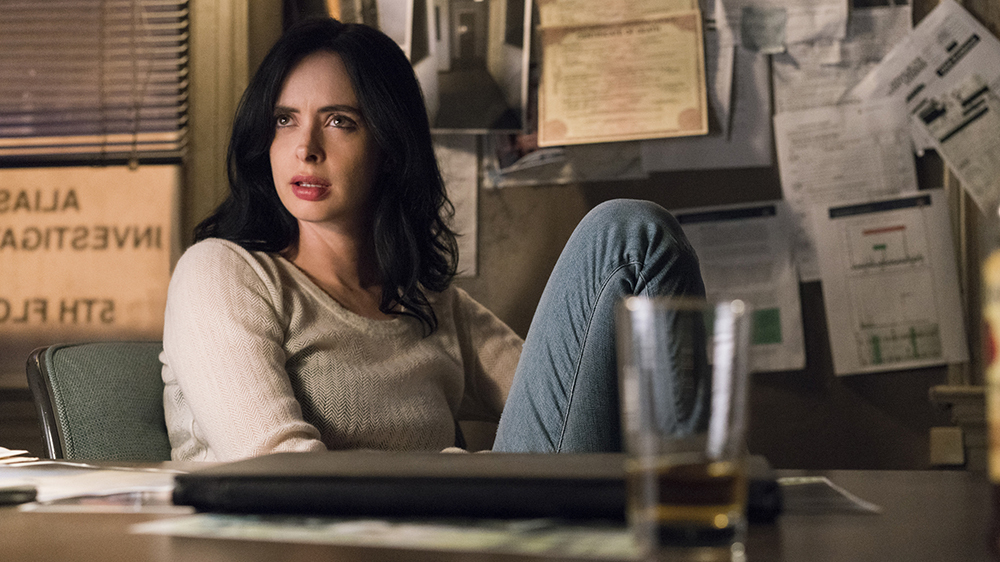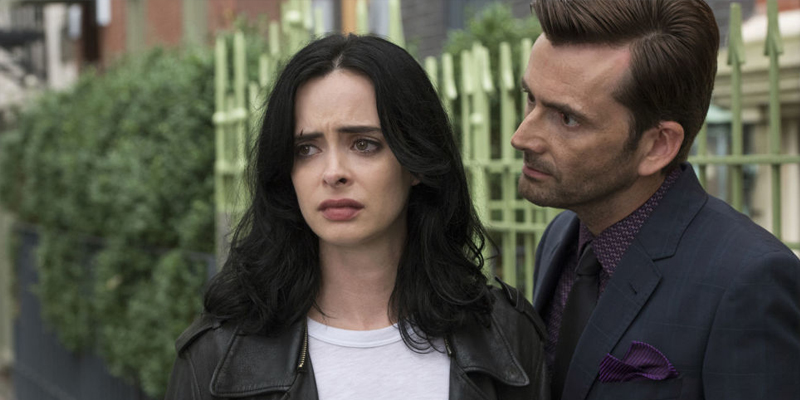Jessica Jones Gets The Messy Origin Story She Deserves In Season Two
Jessica Jones was made by scientists and trauma.

The stupendously anticipated second season of Jessica Jones is now on Netflix, and while it’s not as clean and purposeful as the original season, it’s the kind of messy, booze-soaked origin story that she (and we) deserve.
It feels like a million years since Jessica Jones debuted on Netflix in 2016, and showed us just how GOOD a superhero TV show can actually be. Since her outstanding first season, none of the other superhero franchises have managed to create such a well-developed character.
Measuring up against such a huge first season was always going to be difficult, and unfortunately season two starts off slowly. For the first four episodes, it struggles to make us care about the origins of Jessica’s powers, and honestly makes us wonder if she even cares.
But persevere — because once the plot kicks off, it does unique justice to our favourite sarcastic, hard-drinking, reluctant hero.
*Spoilers abound past this point, watch out!*

Let’s Start At The Beginning
Season two makes an interesting choice: it decides to delve into the origin story of Jessica Jones.
This is kinda bold because as a genre, it seems like we’re moving further away from origin stories as being the default plotline for superheroes — especially after being absolutely awash in films like Iron Man, Thor and the 7000 Spiderman reboots, all of which deal with hapless dickhead getting powers of some kind.
So it was kinda surprising that after such a revolutionary first season, we’d go back to what looks like a fairly standard story that’s been done a thousand times before.
Jessica Jones‘ second season presents a fairly basic set up — her goal is to discover who had experimented on her, stop a super-powered killer, get some revenge, bash some heads and move on. But after four episodes, it becomes glaringly obvious that this isn’t the path she’s on at all.
What Makes A Superhero?
But this is what makes Jessica Jones so unique, because while we do find out about the extremely Wolverine-esque background to her powers (scientists, side-effects, excessive needles), Jessica’s origins are less about how she got so strong and punchy, and more about how she got so sad and drunk.

Having already faced her PTSD at the hands of Kilgrave head on (by snapping his creepy neck), we go further back to the traumatic accident which supposedly killed her entire family and gave the scientists a reason to experiment on her.
But we also get to learn about some of her life after that, focusing specifically on her often tumultuous relationship with Trish as she went through her teen starlet phase.
Probably one of the best episodes of the season flashbacked to a teenage Jessica Jones falling in love, throwing around her superstrength powers indiscriminately and being happy.
The episode is fantastic because Krysten Ritter is COMPLETELY believable as a teenager (getting some extreme Gilmore Girl vibes), and because without belabouring the point, we see the tragedies that caused her to lose any joy or desire for her own super powers.
From the first moment we see Jessica Jones, we get this idea that her life is unsustainable, that she’s only managing to ward off complete collapse by the skin of her fingers and liberal applications of whiskey.
Be Careful What You Wish For
Rather than pitting Jessica up against another villain, the show instead tests her by giving her everything she’s ever wanted — answers about her past, her family, even briefly the possibility of an escape from her own tragedy.
Bringing her mother back from the dead as a semi-deranged super-strengthed monster who’s in love with the naive doctor who gave Jessica her unwanted powers is a perfect poisoned chalice.

“Mum, stop MURDERING people, you’re so EMBARRASSING!”
We’re so used to heroes being spurred by the losing the people they love, so it’s perfectly Jessica Jones to be tormented instead by someone she loves coming back. The relationship between Jessica and her mother, even with all its turmoil and distrust and violence, is truly compelling to watch.
It also sets her up for the tragedy of losing her family again.
Heroism As A Choice
Jessica isn’t a “hero” in the sense that she’s out to do good in the world, and she’s not even an anti-hero. She’s a good person whose powers have brought her nothing but pain.
“If you say great power comes with great responsibility, I swear I’ll throw up on you,” says Jones at some point, riffing on the famous Spiderman line. It’s worth contrasting the two heroes. Spiderman, also “gifted” with powers, uses the trauma of losing his uncle as a spur to become heroic. He chooses to take responsibility for problems that aren’t really his own.
Jessica, in comparison, is burdened with powers and subsequently weighed down with responsibilities that she never asked for (being used as the pawn of a psychic madman, looking after her homicidal mother, fending off the jealousy of her own sister, just to name a few).
The gritty, noir aesthetic of the show (which season two really knocks out of the park in regards to visuals and music) are more than just a gimmick — it places Jessica Jones in the same canon as the hardboiled detectives from the genre who are struggling just to get by, and find themselves having to be good people at their own expense.

Survival, rather than big punches or long jumping, is Jessica Jones’ super power.
The Consequences Of Trauma
At the end of the day, Jessica Jones shows us the extended consequences of trauma, and the fact that having superhuman powers only makes people a magnet for more, rather than warding it away.
Throughout the show, we are shown characters who struggle to exist within the parameters of trauma, who are trying not to be defined by their pain. The (excellent) side-plots of Trish and Malcolm, for example, specifically place this trauma within the category of addiction and relapse.
Jessica’s mum Alisa Jones is a good metaphor for the show’s views on trauma, with the symptom of her pain being manifested by her supernatural and deadly rages — any normal life is denied to her, because at best she can only try to manage herself, to mitigate the risks — she can never truly be free.

Much like Alisa, Jessica can only yearn for freedom from her burdens, and while the season ends with her realising her isolation and trying to forge a relationship with her hot new lover, we also see that as a consequence she’s lost her two closest friends.
Throughout the arc, she’s seen her own mother killed and she’s been betrayed due to the jealousy of the woman we see as her sister.
There is no catharsis for Jones after rattling the skeletons in the closet. Her origin story provides just more sadness, which she has to keep lifting — and as much as we might want her to be happy, it’s a tribute to the strength of her character that the show didn’t give her that.
—
Patrick Lenton is an author and staff writer at Junkee. He Tweets @Patrick Lenton
